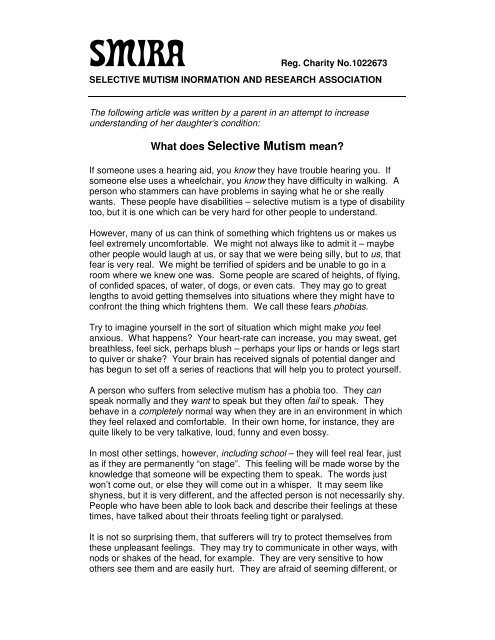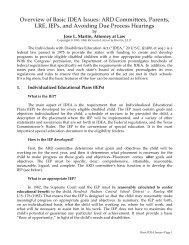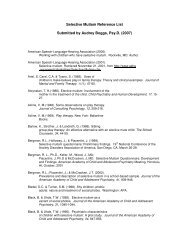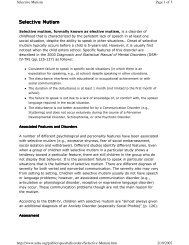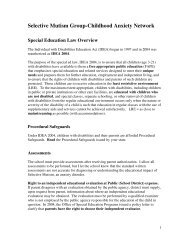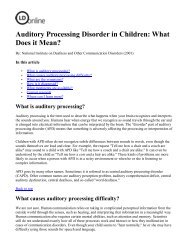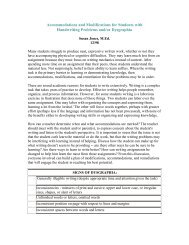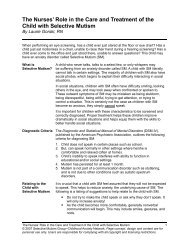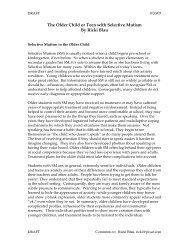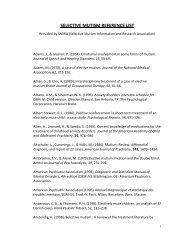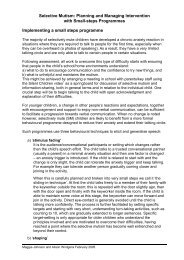What SM Means - Selective Mutism Group
What SM Means - Selective Mutism Group
What SM Means - Selective Mutism Group
Create successful ePaper yourself
Turn your PDF publications into a flip-book with our unique Google optimized e-Paper software.
<strong>SM</strong>IRA Reg.<br />
SELECTIVE MUTI<strong>SM</strong> INORMATION AND RESEARCH ASSOCIATION<br />
Charity No.1022673<br />
The following article was written by a parent in an attempt to increase<br />
understanding of her daughter’s condition:<br />
<strong>What</strong> does <strong>Selective</strong> <strong>Mutism</strong> mean?<br />
If someone uses a hearing aid, you know they have trouble hearing you. If<br />
someone else uses a wheelchair, you know they have difficulty in walking. A<br />
person who stammers can have problems in saying what he or she really<br />
wants. These people have disabilities – selective mutism is a type of disability<br />
too, but it is one which can be very hard for other people to understand.<br />
However, many of us can think of something which frightens us or makes us<br />
feel extremely uncomfortable. We might not always like to admit it – maybe<br />
other people would laugh at us, or say that we were being silly, but to us, that<br />
fear is very real. We might be terrified of spiders and be unable to go in a<br />
room where we knew one was. Some people are scared of heights, of flying,<br />
of confided spaces, of water, of dogs, or even cats. They may go to great<br />
lengths to avoid getting themselves into situations where they might have to<br />
confront the thing which frightens them. We call these fears phobias.<br />
Try to imagine yourself in the sort of situation which might make you feel<br />
anxious. <strong>What</strong> happens? Your heart-rate can increase, you may sweat, get<br />
breathless, feel sick, perhaps blush – perhaps your lips or hands or legs start<br />
to quiver or shake? Your brain has received signals of potential danger and<br />
has begun to set off a series of reactions that will help you to protect yourself.<br />
A person who suffers from selective mutism has a phobia too. They can<br />
speak normally and they want to speak but they often fail to speak. They<br />
behave in a completely normal way when they are in an environment in which<br />
they feel relaxed and comfortable. In their own home, for instance, they are<br />
quite likely to be very talkative, loud, funny and even bossy.<br />
In most other settings, however, including school – they will feel real fear, just<br />
as if they are permanently “on stage”. This feeling will be made worse by the<br />
knowledge that someone will be expecting them to speak. The words just<br />
won’t come out, or else they will come out in a whisper. It may seem like<br />
shyness, but it is very different, and the affected person is not necessarily shy.<br />
People who have been able to look back and describe their feelings at these<br />
times, have talked about their throats feeling tight or paralysed.<br />
It is not so surprising them, that sufferers will try to protect themselves from<br />
these unpleasant feelings. They may try to communicate in other ways, with<br />
nods or shakes of the head, for example. They are very sensitive to how<br />
others see them and are easily hurt. They are afraid of seeming different, or
eing mocked, or criticised or rejected, and more than anything, they do not<br />
want anyone to know they are afraid.<br />
<strong>What</strong> happens then, is that they start to avoid activities which they would<br />
genuinely like to take part in. They know that speaking leads to acceptance<br />
and to making friends, but speaking, and especially starting a conversation, is<br />
incredibly difficult for them. They avoid speaking by withdrawing from people<br />
and isolating themselves. This means that they do not really learn how to<br />
socialise with other people. They become very lonely, even though they are<br />
not loners. They may protect themselves by pretending, and even believing,<br />
that they did not want these things in the first place.<br />
Some facts:<br />
<strong>Selective</strong> mutism was once thought to be very rare, but the incidence is said<br />
to be almost identical to the rate of narrowly defined autism.<br />
It is more common in girls than in boys.<br />
No single cause has been established, though emotional, psychological and<br />
social factors may influence its development.<br />
Children with selective mutism are likely to…<br />
• Find it difficult to look at you when they are anxious – they may turn their<br />
heads away and seem to ignore you. You might think that they are being<br />
unfriendly, but they are not – they just do not know how to respond.<br />
• Not smile, or look blank or expressionless when anxious – in school, they<br />
will be feeling anxious most of the time and this is why it is hard for them to<br />
smile, laugh or show their true feelings, even when they have a wicked sense<br />
of humour.<br />
• Move stiffly or awkwardly when anxious, or if they think that they are being<br />
watched.<br />
• Find it incredibly difficult to answer the register, or to say hello, goodbye<br />
or thank-you – this can seem rude or hurtful, but it is not intentional.<br />
• Be slow to respond – in any way – to a question.<br />
• Worry more than other people<br />
• Be very sensitive to noise or touch or crowds.<br />
• Be intelligent, perceptive and inquisitive<br />
• Be very sensitive to the thoughts and feelings of others<br />
• Find it difficult to express their own feelings<br />
• Have good powers of concentration.<br />
References:<br />
Robert Goodman & Stephen Scott. Child Psychiatry, Blackwell Science 1997.<br />
Maggie Johnson & Alison Wintgens (2001) Speechmark Publishing Ltd. Telford<br />
Road, Bicester Oxon. OX26 4LQ.<br />
J.Teece/AS/<strong>SM</strong>IRA/2003


